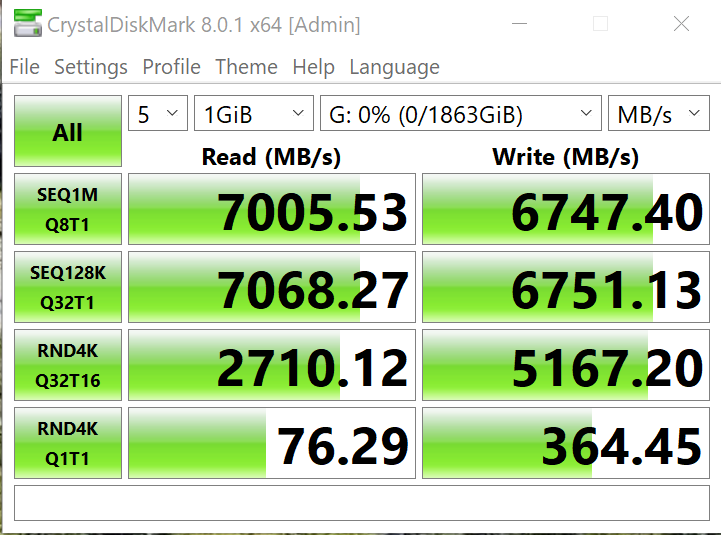CRYSTAL DISK BENCHMARK VER. 7.0.0 x64
Crystal Disk Benchmark is used to measure read and write performance through sampling of random data which is, for the most part, incompressible. Performance is virtually identical, regardless of data sample so we have included only that using random data samples.
THROUGHPUT
IOPS
Two things we have noticed with the new Intel Gen 4 system is that benchmark performance increases significantly with certain variables. For instance, we can see in the first result above that low 4K write performance peaks at 364MB/s while the second chart shows write IOPS at over one million.
The toughest benchmark available for solid state drives is AS SSD as it relies solely on incompressible data samples when testing performance. For the most part, AS SSD tests can be considered the ‘worst case scenario’ in obtaining data transfer speeds and many enthusiasts like AS SSD for their needs.
ANVIL STORAGE UTILITIES PROFESSIONAL
Anvil’s Storage Utilities (ASU) are the most complete test bed available for the solid state drive today. The benchmark displays test results for, not only throughput but also, IOPS and Disk Access Times. Not only does it have a preset SSD benchmark, but also, it has included such things as endurance testing and threaded I/O read, write and mixed tests, all of which are very simple to understand and use in our benchmark testing.
Although the throughput performance doesn’t initially appear strong, IOPS and Response Times have resulted in the highest result we have seen through Anvil to date, this being above the 27000 Overall Point Mark.
TxBench is one of our newly discovered benchmarks that we works much the same as Crystal Diskmark, but with several other features. Advanced load benchmarking can be configured, as well as full drive information and data erasing via secure erase, enhanced secure erase, TRIM and overwriting. Simply click on the title for a free copy.
AJA VIDEO SYSTEM DISK TEST
The AJA Video Systems Disk Test is relatively new to our testing and tests the transfer speed of video files with different resolutions and Codec.
 The SSD Review The Worlds Dedicated SSD Education and Review Resource |
The SSD Review The Worlds Dedicated SSD Education and Review Resource | 


How long can I write at the write speed of 6.8GB/s? Until the SSD is fully written or just a few seconds ?
I have this feeling that you already know the answer to that and it would be one heck of a challenge actually ever achieving a steady 6.8GB/s transfer write speed. This is the flash industry theme, however, where the SSD is advertised at its maximum potential and not steady state or speeds that will occur over linger file transfers. I would guess that this is because those speeds are so greatly affected by the data sample they are moving, whether it be media or much smaller OS files for instance. We could relate this to how vehicles advertise their high mileage couldn’t we? Thanks for jumping in!